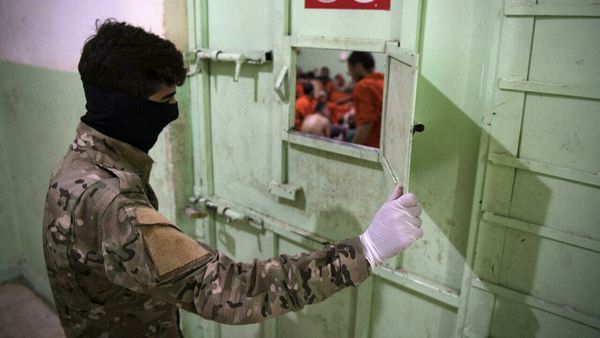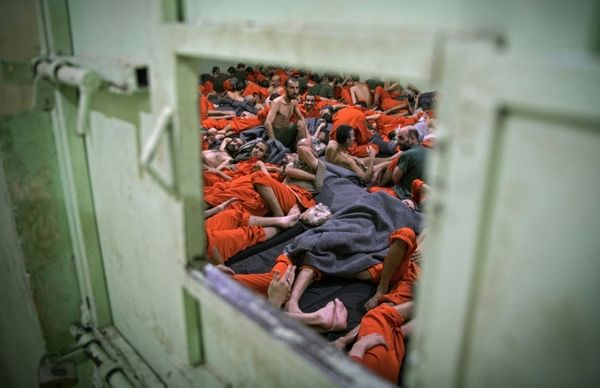
Beirut (AFP) - Kurdish forces battled jihadists in northeastern Syria's largest city Friday following a prison attack that claimed hefty death tolls on both sides and set Islamic State fighters free.
The prison break from the Syrian detention facility holding the largest number of IS suspects was one of the group's most significant attacks since its "caliphate" was declared defeated in the war-torn country nearly three years ago.
As IS operatives launched their bid to free some of the estimated 3,500 fellow fighters jailed at Ghwayran prison in the Syrian city of Hasakeh, the jihadists killed 11 soldiers in an attack on an army base in the east of neighbouring Iraq.
At least 18 members of the Kurdish security forces were killed in the clashes that continued to rage in Hasakeh hours after the prison attack began late on Thursday, the Syrian Observatory for Human Rights said.
"The number of those killed among Kurdish internal security forces and prison guards stands at 18," Observatory head Rami Abdel Rahman told AFP.
The war monitor, providing figures that were not immediately confirmed by the authorities of the autonomous Kurdish region, also said at least 16 jihadists were killed in the fighting.
The brazen IS operation sewed chaos in Hasakeh, forcing people to flee the area around Ghwayran prison.
IS fighters hunkered down in homes around the facility, sometimes using residents as human shields, as Kurdish forces fought to retake full control of the neighbourhood and hunt down prisoners on the loose.
IS has carried out regular attacks against Kurdish and regime targets in Syria since the last rump of its once-sprawling proto-state was defeated on the banks of the Euphrates in March 2019.
Human shields
Most of their guerrilla attacks have been against military targets and oil installations in remote areas but the Hasakeh prison break could mark a new phase in the group's resurgence.
The Syrian Democratic Forces (SDF), the Kurds' de-facto army in northeast Syria, said it had recaptured 89 IS detainees in its sweep of the area.
"Clashes continue in the vicinity of the prison," it said in a statement.
The US-led international coalition formed to battle IS acknowledged the attack and added that the SDF had suffered casualties but did not say how many.
IS "remains an existential threat in Syria and cannot be allowed to regenerate," the coalition said in a statement after Thursday's attack.
The Kurdish authorities have long warned they did not have the capacity to hold, let alone put on trial, the thousands of IS fighters captured in years of operations.
According to Kurdish authorities, more than 50 nationalities are represented in a number of Kurdish-run prisons where more than 12,000 IS suspects are now held.
From France to Tunisia, many of the IS prisoners' countries of origins have been reluctant to repatriate them, fearing a public backlash at home.
Prison breaks have been a recurring part of jihadist groups' strategy in both Iraq and Syria for over a decade.
Jihadist strategy
Before becoming the world's most wanted man, Abu Bakr al-Baghdadi, the leader of what was later to become known as the "Islamic State", had launched a campaign in 2012 focused on releasing prisoners.
His proclamation of the Islamic State's so-called caliphate in 2014 across swathes of Iraq and Syria came a wave of operations in Iraq during which several hundred fighters were freed, including from the notorious Abu Ghraib prison.
"Jailbreaks and prison riots were a central component of IS resurgence in Iraq and is a serious threat in Syria today," said Dareen Khalifa, senior Syria analyst at International Crisis Group.
She pointed out that many of the prisons in the Kurdish-run areas of Syria where much of the IS caliphate's former "army" is being held were converted schools ill-suited to holding high-risk detainees for long periods.
Since Kurdish forces backed by the US-led coalition flushed out the last die-hard jihadists holding out in the village of Baghuz in 2019, IS has been patiently rebuilding.
The confusion and corruption that are rife in the vast desert expanses on both sides of the Iraqi-Syrian border have allowed IS remnants to lie low and plot their next moves.










